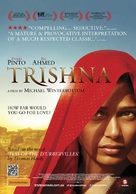Reviews provided by RottenTomatoes
Manohla Dargis, New York Times: Life is suffering, as the Buddha said (including in Hardy's emotionally grinding novels), but it's more complex and contradictory than the ginned-up realism Mr. Winterbottom delivers here. Read more
Joe Morgenstern, Wall Street Journal: Spectacular visually, though awfully somber dramatically. Read more
John Hartl, Seattle Times: Featuring a Bollywood subplot and an irresistible East-meets-West score, the movie is lush and lusty: both a strong vehicle for Pinto and a good match for Winterbottom's impressionistic style. Read more
Ty Burr, Boston Globe: "Trishna" should move the soul and engage the tear-ducts, yet it passes by as distant as it is lovely. And the blame must fall on the movie's star, Freida Pinto. Read more
J. R. Jones, Chicago Reader: The new setting revivifies the harsh forces of class and gender at work in the story. Read more
Peter Rainer, Christian Science Monitor: Winterbottom uses the Indian locations with a documentarian's eye and a dramatist's mind. Read more
Lisa Kennedy, Denver Post: Trishna engages the potent collisions of the rural and the urban, the poor and the rich, and considers how these interactions unfold in a romance and how they might also destroy it. Read more
Tom Long, Detroit News: Winterbottom has complete control of the film's look and feel, but the story seems to run away from him. Read more
Owen Gleiberman, Entertainment Weekly: The shots of urban traffic jams have more spark than the story, which skips from a pregnancy to the filming of a musical to murder - without convincing us of any of it. Read more
Sheri Linden, Los Angeles Times: As a portrait of a nation amid accelerated and profound change, "Trishna" is a vivid piece of cinema. As a melodrama, it's provocative without being emotionally involving, the central performance more distancing than engaging. Read more
Rafer Guzman, Newsday: "Trishna" works largely on the strength of Winterbottom's clever updates of a century-old story. Read more
Ian Buckwalter, NPR: Something in Hardy's tragic inclinations obviously appeals to Winterbottom; this is the third time he's adapted one of the author's novels, with the liberties he takes with the source material increasing each time. Read more
Lou Lumenick, New York Post: Pinto's lack of dramatic range (she basically has two expressions) and an awkward third act do not provide a solid foundation for Hardy's tragic ending. Read more
Roger Ebert, Chicago Sun-Times: Winterbottom is a director who never repeats himself, films all over the world, and in "Trishna," effortlessly embeds his story in modern India. Read more
Andrew O'Hehir, Salon.com: This is one of the best and bravest of recent adaptations of classic literature; if you're even a little bit intrigued, ignore what others say and don't let it pass you by. Read more
Mick LaSalle, San Francisco Chronicle: Winterbottom gives a bright panorama of Indian life, from the agrarian countryside to the tumult of Jaipur and the sophistication of Mumbai. Read more
Colin Covert, Minneapolis Star Tribune: While the film never delves deep enough into its characters' emotions to be truly spellbinding, it's well worth seeing. Read more
James Adams, Globe and Mail: A loose but nonetheless pretty faithful recasting of Hardy's penultimate tragedy, Tess of the d'Urbervilles. Read more
Alonso Duralde, TheWrap: By combining the characters of Lord d'Urberville and Angel Clare into one person -- spoiled rich boy Jay (Riz Ahmed, Four Lions) -- Winterbottom strips the tale of a compelling second act, making things sag terribly in the middle. Read more
Cath Clarke, Time Out: Sails along on a gorgeous score by Shigeru Umebayashi and Bollywood composer Amit Trivedi. Read more
Joshua Rothkopf, Time Out: The diffidence here is ingrained in the pacing and plot: Winterbottom hardly seems roused by the forbidden affair, and even a Bollywood-style dance number feels halfhearted. Read more
Linda Barnard, Toronto Star: This escalation of passions and Trishna's humiliation demands much of both actors, yet neither Pinto nor Ahmed is completely convincing and this is the main flaw of Trishna. Read more
Karina Longworth, Village Voice: The film's exploration of extremes coexisting uneasily is especially palpable in a subplot involving Mumbai's film industry. Read more
Ann Hornaday, Washington Post: A rare unsatisfying swerve from an otherwise reliably provocative career. Read more

